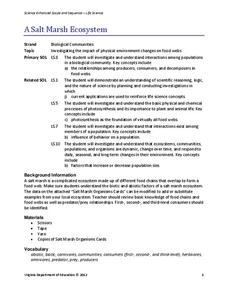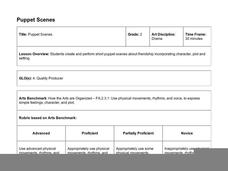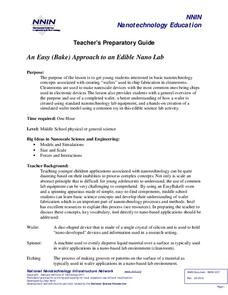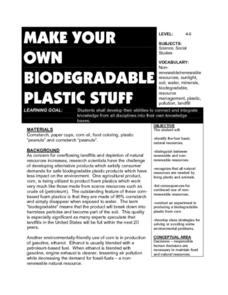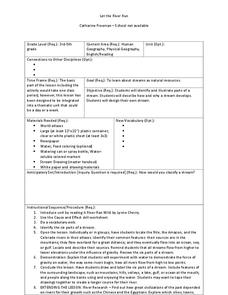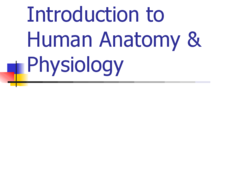Virginia Department of Education
Freshwater Food Chains
What's in the water? Encourage your class to further explore this question and learn about pond ecosystems, food chains, and food webs as they complete this hands-on activity. They view the environment from a new perspective after...
Curated OER
ESOL Environment and the World
Students examine a recyling bin and the many different items that can be recycled. They practice loading the recyclie bin and using the correct vocabulary to explain each item.
Virginia Department of Education
A Salt Marsh Ecosystem
What a web we weave. Pupils use yarn as the primary resource to create a web depicting the intricacies of a salt marsh ecosystem. They participate in a question and answer session, which leads to an in-depth facilitated discussion about...
Curated OER
Water Quality and Environmental Pollution
Learners use litmus paper to begin to discover the qualities of acids and bases. They learn about pH by testing clear liquids for acidity with purple cabbage juice as an indicator. The video Streamkeeper, with Bill Nye, and other video...
Hawaiʻi State Department of Education
Puppet Scenes
Explore character, plot, and setting through dramatic puppet play. Second graders discuss basic story elements and then practice making a character with their sock puppets. After they've crafted a dynamic puppet, they pair up to create a...
National Nanotechnology Infrastructure Network
An Easy (Bake) Approach to an Edible NanoLab
You can make it if you bake it! Young scientists model electronic chip fabrication with an easy bake oven. They create a design to embed in their brownie "chips" and compare their models to wafer production in basic nanotechnology.
Curated OER
Make Your Own Biodegradable Plastic Stuff
Students identify the four basic natural resources. They distinguish bettween renewable and non-renewable resources. Pupils recognize that all natural resources are needed by living plants and animals. Students list consequences for...
Advocates for Human Rights
All about Me!
Celebrate the uniqueness of your students with this character building lesson series. In order to learn about and appreciate diversity and individuality, children create All About Me books by cutting out and drawing pictures that...
Curated OER
A Thoreau Look at Our Environment
Sixth graders write journal entries o school site at least once during each season, including sketched and written observations of present environment. They can use sample topographical maps and student's own maps. Students can use...
Curated OER
New Words: Make a Conservation Dictionary
Gosh dictionaries are great, and your class gets to make one of their own. They look up and write down the dictionary definition to nine words related to conservation and pollution prevention. They list their words alphabetically for...
Curated OER
Oceans in Motion
This simple lesson introduces children to basic marine life as well as to show them the necessity of protecting aquatic environments. Some famous marine life animals are introduced via vocabulary words, then children cut out pictures of...
Curated OER
Air, Air Everywhere! Lesson 2: Acid Rain
Middle school environmentalists record the pH of four different liquids, including two aerosol cleaning products. They liken the products to acid rain and speculate in writing which might affect the human respiratory system. Although...
Curated OER
Living On Earth
Students discover the many different animals within various habitats and discover how each individual species interacts with its particular environment. Through charting different animals and their distinct habitat and matching animals...
Curated OER
Let the River Run
Students explore the environment by reading a story in class. In this water formation lesson, students define environmental terms such as rivers, streams, gulf, oceans and lakes. Students read the story A River Ran Wild and discuss the...
Curated OER
Introduction to Human Anatomy & Physiology
If the only support you are in search of is lists of vocabulary terms, this presentation may fit the bill. Slides simply list terminology. These categories are included: hierarchy of structural organization, cell functions, cell...
Curated OER
Reading Poetry
Present your class with an overview of poetry-related information. The slides are clearly organized by topic, starting with reading poetry, ending with myths, and touching on everything from the five senses to open and closed forms of...
Curated OER
Basic Knowledge of Big Cats
First graders create a KWL chart on big cats. In this animal science lesson plan, 1st graders brainstorm what they already know about big cats and research big cats using various suggested websites. Students fill in the last column of...
Teach Engineering
An Introduction to Air Quality Research
Viewers are a PowerPoint are exposed to the idea that pollutants are in more than just the air we breathe. the presentation provides information about the layers of the earth's atmosphere and takes a look at the pollutants in the...
Boward County Public Schools
Hoot Activities
If you're looking for engaging, cross-curricular, inquiry-based activities and projects to support your class reading of Carl Hiaasen's Hoot, you've come to the right place!
National Wildlife Federation
Citizen Science to the Rescue!
You don't have to be a scientist or even out of high school to contribute to scientific research. In the 12th lesson plan in the series of 21, scholars use this opportunity to add to the growing body of scientific knowledge and consider...
California Academy of Science
Color Vision Genetics Evolution Simulation
At one point, all mammals carried only two color receptors, but now most humans carry three. An informative presentation and hands-on activity demonstrate how this evolved through genetics. By participating in the activity, pupils...
Curated OER
ADULT ESOL LESSON PLAN--Environment and the World
Students locate and trace Florida on a United States map as well as their local counties and city of residence on a state map. In addition, they label all the directions north, south, east and west on each map.
Curated OER
Brine Shrimp Life Cycle
Third graders examine brine shrimp through "A Sea Monkey's Life" story. They study the living environments and life cycle of brine shrimp. They look at brine shrimp and cysts through a microscope, identifying new vocabulary that was...
Curated OER
Draw an Alien in Natural Habitat
Students apply prior knowledge of living things, structures of living things and how living things sense and respond to their environment. In this habitat lesson, students review the basic needs of organisms to survive. Students create...




